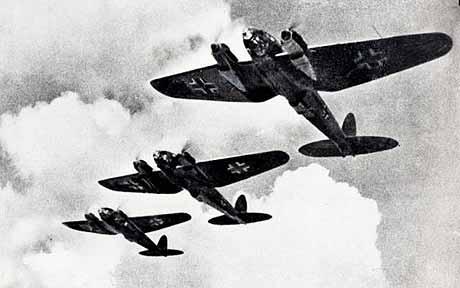The following events took place in England during the Second World War. German airplanes flew in the sky every night, dropping bombs and spreading destruction in the cities and the small towns. This is the story of a young boy who studied in a “cheder” during that time.
We studied in the area of the main synagogue of the city, a new building which had been built a short time before on a very large plot of land. In the corner of the land was an old building two stories high. On the top floor there was a Beit Midrash where the Jews would pray during the week, while on Shabbat and holidays the prayers would be held in the new synagogue. The rooms of our cheder were on the ground floor of the old building. We also had a cellar which served as an air-raid shelter, where we would go when the sirens would sound.
Chanukah arrived, the happy festival of lights. But we had been warned that no single ray of light should ever be visible outside at night, in order not to show the German pilots where our houses were. We were very sad that because of the horrid Germans we could not put our candles on the window sills, as was the regular custom. But we recited the blessings over the candles which we put on the table, after covering the windows with black paper. We hoped with all our hearts that we would witness a repeat of the miracle of Chanukah, and that the German enemy would be defeated, just as Antiochus had been vanquished in ancient times.
On the fifth night of Chanukah, all the students of the cheder gathered in the main synagogue to light the candles and to enjoy a cheerful Chanukah party. However, as purposely to upset us, the sirens immediately began to wail, announcing an air-raid. We were well prepared for such an event. Without showing any signs of fear, we organized into straight lines and went to the Beit Midrash, where steps led down to the shelter. But this time, before we managed to reach the old building, we heard the terrible sounds of explosions. The distance between the two buildings was not great and it only took a moment to cross from one to the other. But this moment appeared to us as an eternity. Finally, we reached the other building and descended the stairs, and we all took our places in the shelter, as we had done many times before. Our teacher read off our names from a list to make sure that everybody was there, and then he taught us a new Chanukah song. We all sang as loud as we could, as if we wanted the Germans to hear us and blow themselves up.
“And now, children, we will light the Chanukah candles and continue with the party that was interrupted,” our teacher said. But then he remembered that we had left the candles in the synagogue. This upset us very much, but there was nothing we could do. “Just as without an etrog we cannot recite the appropriate blessing, without candles there is nothing for us to light. Let us pray to G-d that He will accept our desire to observe the mitzva of lighting the candles as if we had actually performed it,” the teacher said.
But I refused to accept this. I was overcome by a strong urge to go to the synagogue and retrieve the Chanukah candles. This was very dangerous, but I still wanted to do it. My only question was whether I should ask the teacher for permission – and he would certainly refuse – or simply sneak out without attracting any attention. I finally decided to take responsibility for my own actions without asking anybody else. I remembered what we had been taught by our sages, “a messenger performing a mitzva is never harmed.” So, without losing a moment I managed to sneak away and climb the stairs.
Email yikhat1@smile.net.il with Reactions and Suggestions for Stories. Reprinted with permission from Zomet Institute (www.zomet.org.il). Translated from the Hebrew by Moshe Goldberg. To subscribe to receive the complete version of Shabbat B’Shabbato please write to dan@zomet.org.
The words of this author reflect his/her own opinions and do not necessarily represent the official position of the Orthodox Union.

